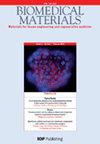Evaluation of bone-regeneration effects and ectopic osteogenesis of collagen membrane chemically conjugated with stromal cell-derived factor-1 in vivo
IF 3.7
3区 医学
Q2 ENGINEERING, BIOMEDICAL
引用次数: 8
Abstract
Because the collagen membrane lacks osteoinductivity, it must be modified with bioactive components to trigger rapid bone regeneration. In this study, we aimed to evaluate the bone regeneration effects of a collagen membrane chemically conjugated with stromal cell-derived factor-1 alpha (SDF-1α) in rat models. To this end, different collagen membranes from four groups including a control group with a Bio-Oss bone substitute + collagen membrane; physical adsorption group with Bio-Oss + SDF-1α physically adsorbed on the collagen membrane; chemical cross-linking group with Bio-Oss + SDF-1α chemically cross-linked to the collagen membrane; and cell-seeding group with Bio-Oss + bone marrow mesenchymal stem cells (BMSCs) seeded onto the collagen membrane were placed in critical-sized defect models using a guided bone regeneration technique. At 4 and 8 weeks, the specimens were analyzed by scanning electron microscopy, energy-dispersive x-ray spectroscopy, micro-computed tomography, and histomorphology analyzes. Furthermore, ectopic osteogenesis was examined by histological analysis with Von Kossa staining, with the samples counterstained by hematoxylin and eosin and immunohistochemical staining. The results showed that in the chemical cross-linking group and cell-seeding group, the bone volume fraction, bone surface area fraction, and trabecular number were significantly increased and showed more new bone formation compared to the control and physical adsorption groups. Von Kossa-stained samples counterstained with hematoxylin and eosin and subjected to immunohistochemical staining of 4-week implanted membranes revealed that the chemical cross-linking group had the largest number of microvessels. The collagen membrane chemically conjugated with SDF-1α to significantly promote new bone and microvessel formation compared to SDF-1α physical adsorption and showed similar effects on new bone formation as a BMSC seeding method. This study provided a cell-free approach for shortening the bone healing time and improving the success rate of guided bone regeneration.基质细胞衍生因子-1化学偶联胶原膜在体内骨再生和异位成骨作用的评价
由于胶原膜缺乏骨诱导性,必须用生物活性成分对其进行修饰,以引发快速的骨再生。在本研究中,我们旨在评估与基质细胞衍生因子-1α(SDF-1α)化学偶联的胶原膜在大鼠模型中的骨再生作用。为此,来自四组的不同胶原膜,包括具有Bio-Oss骨替代物+胶原膜的对照组;Bio-Oss+SDF-1α物理吸附在胶原膜上的物理吸附基团;化学交联基团与Bio-Oss+SDF-1α化学交联到胶原膜上;和将Bio-Oss+骨髓间充质干细胞(BMSC)接种到胶原膜上的细胞接种组使用引导骨再生技术放置在临界尺寸的缺损模型中。在第4周和第8周,通过扫描电子显微镜、能量色散x射线光谱、显微计算机断层扫描和组织形态学分析对标本进行分析。此外,异位成骨通过Von-Kossa染色的组织学分析进行检查,苏木精和伊红以及免疫组织化学染色对样品进行复染。结果显示,与对照组和物理吸附组相比,化学交联组和细胞接种组的骨体积分数、骨表面积分数和小梁数量显著增加,并显示出更多的新骨形成。Von-Kossa染色的样品用苏木精和伊红复染,并对植入4周的膜进行免疫组织化学染色,结果显示化学交联组的微血管数量最多。与SDF-1α物理吸附相比,与SDF-1 a化学偶联的胶原膜显著促进新骨和微血管的形成,并显示出与BMSC接种方法类似的对新骨形成的影响。本研究为缩短骨愈合时间和提高引导骨再生的成功率提供了一种无细胞方法。
本文章由计算机程序翻译,如有差异,请以英文原文为准。
求助全文
约1分钟内获得全文
求助全文
来源期刊

Biomedical materials
工程技术-材料科学:生物材料
CiteScore
6.70
自引率
7.50%
发文量
294
审稿时长
3 months
期刊介绍:
The goal of the journal is to publish original research findings and critical reviews that contribute to our knowledge about the composition, properties, and performance of materials for all applications relevant to human healthcare.
Typical areas of interest include (but are not limited to):
-Synthesis/characterization of biomedical materials-
Nature-inspired synthesis/biomineralization of biomedical materials-
In vitro/in vivo performance of biomedical materials-
Biofabrication technologies/applications: 3D bioprinting, bioink development, bioassembly & biopatterning-
Microfluidic systems (including disease models): fabrication, testing & translational applications-
Tissue engineering/regenerative medicine-
Interaction of molecules/cells with materials-
Effects of biomaterials on stem cell behaviour-
Growth factors/genes/cells incorporated into biomedical materials-
Biophysical cues/biocompatibility pathways in biomedical materials performance-
Clinical applications of biomedical materials for cell therapies in disease (cancer etc)-
Nanomedicine, nanotoxicology and nanopathology-
Pharmacokinetic considerations in drug delivery systems-
Risks of contrast media in imaging systems-
Biosafety aspects of gene delivery agents-
Preclinical and clinical performance of implantable biomedical materials-
Translational and regulatory matters
 求助内容:
求助内容: 应助结果提醒方式:
应助结果提醒方式:


